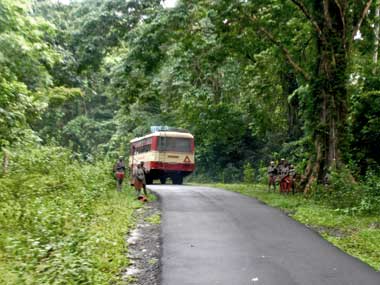Remember the Andaman Trunk Road (ATR) that shot to infamy in 2012 when a British publication reported how local touts and policemen conduct human safaris in the Jarawa reserve in Andaman where tourists “toss scraps of food to half-naked tribal people and order them to dance”?
More than a decade ago, the Supreme Court had ordered closure of the illegal road – NH 223 – cutting through the Jarawa reserve. The 2004 Jarawa Policy also called for a supplementary route to reduce traffic on the ATR. Subsequently, March 2015 was set as the deadline for opening an alternate sea route between Port Blair and Baratang.
The highway is still very much operational ferrying tourists, the A&N administration is in no hurry to develop the alternate sea route and now local MP Bishnu Pada Roy has announced plans for widening of the ATR and constructing two new bridges to facilitate more traffic through the Jarawa reserve. The BJP MP also promised to bring the Jarawas into the mainstream and ease restrictions in the buffer zone around their reserve to allow commercial activities.
Only this January, President Pranab Mukherjee cautioned against attempts at assimilating the Jarawas into the mainstream. “Though they (the Jarawas) do not know what Parliament is and what is the job of a Member of Parliament, it is his job to protect them in their own environment and in their own circumstances. In the name of so-called development, you should not completely destroy them,” Mukherjee urged the sitting BJP MP at the inauguration of the Andaman & Nicobar Tribal Research and Training Institute in Post Blair.
In the past, such attempts at assimilation have led to the complete disappearance of entire tribes and communities. Forced settlement destroyed the Great Andamanese tribes that are represented by no more than 53 survivors today. In 2010, we lost Boa – the last member of the Bo, one of the 10 Great Andamanese tribes – and with her the knowledge and language of her people. A few months earlier, another ancient language of the archipelago – Khora – passed with Boa’s neighbour Boro.
The 400-strong Jarawas are also going the way of their ancient, almost-extinct neighbours—the Great Andamanese and the Onge. The Sentinelis are the only exception, thanks to the impregnable coral reefs that make landing on their little island treacherous and to the tribe’s belligerent response to outsiders. They survived the 2005 tsunami on their own even though their island was tilted by the onslaught.
The mainstream has not bothered to learn from the wisdom of these ancient people who have survived in one of the world’s most hostile places for over 30,000 years. Instead, the sole inhabitants of the archipelago till about 200 years ago have been reduced to less than 0.1 per cent of the present population by rapid extermination and influx of settlers.
Sadly, the political consensus in the A&N today is to pack the Jarawas off to some islet and open up the lush reserve, the last repository of natural resources here, to the hungry mainstream. Be it BJP’s Roy or his predecessor Congress’s Manoranjan Bhakta, local MPs have always championed the cause of easing the restrictions in and around the Jarawa reserve.
This January, eight Jarawa girls were abducted by a group of settlers. Then, local media quoted a Jarawa youth complaining about poachers who routinely enter the reserve to lure Jarawa women. “The outside boys pressure them to do a lot. They pressure them with their hands and fingernails when the girls get angry… They have sex with the girls… They drink alcohol in the girls’ house. They sleep in the Jarawa’s house. They smoke marijuana and then chase the girls,” he said, naming the offenders.
But instead of booking even those caught red-handed under the Protection of Aboriginal Tribes Act (1956) that denies bail, the authorities easily let the culprits off. For the record, the population of the Great Andamanese collapsed due to a range of alien ailments — syphillis, measles, influenza — contracted on an epidemic scale from early batches of convicts jailed on the island and their equally wayward custodians.
Incidents of confrontation between the Jarawas and settlers who live close to the reserve are becoming frequent. The conflict began long back when the Jarawas raided orchards owned by the settlers who had encroached upon Jarawa forests. Between 1998 and 2004, the interaction became somewhat friendly when the Jarawa youth learnt to barter honey and venison for alcohol and tobacco. During this period, all government hospitals bordering the reserve opened special wards to treat Jarawas for infections.
Fortunately, the ancient tribe decided to retreat to their forests after 2004. But the new addicts still depend on the outside world for their fix. As long as the highway keeps bringing the increasingly-less-alien world deep inside their shrinking sanctuary, they will remain vulnerable to exploitation, sexual and substance abuse and diseases.
While the global community is anguished, the local administration seems to have decided the Jarawa’s fate. Earlier this month, Theva Neethi Dhas, secretary, Tribal Welfare and Shipping, A&N, washed his hands off the alternate sea route, describing it as a commitment of the Centre. And Lt Governor AK Singh conceded that “there are no boats to spare for the route” even if it is accomplished.
With the BJP MP keen to deliver on his poll promise of plundering the tribal sanctuary in the name of mainstreaming the Jarawas, only an immediate central intervention can safeguard them. Hopefully, Tribal Affairs minister Jual Oram will take note and alert the prime minister.
Images in the copy are taken from Survival International

)




)
)
)
)
)
)